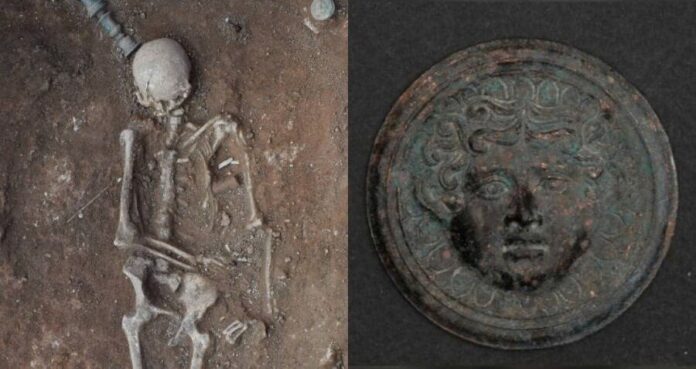Remarkable Discovery Near Kozani, Greece

Archaeologists have unearthed a fascinating find near the city of Kozani in northern Greece – the 2100-year-old skeleton of a woman laid to rest in an ornate bronze bed. This discovery, dating back to the 1st century BC, offers a glimpse into the life of an important figure from ancient Greek society.
The ‘Mermaid Bed’ and Its Occupant
The bronze bed, dubbed the “Mermaid Bed,” features intricate designs that hint at the occupant’s significance:
- An image of a bird with a snake in its mouth, possibly representing the Greek god Apollo
- Bedposts adorned with mermaid depictions
- Gold leaves suggesting the woman was buried wearing a wreath
- Golden threads indicating embroidered clothing or burial shroud
Clues to an Elite Status

Several factors point to the woman’s high social and political standing:
- She was buried alone, without any other individuals
- Four clay pots and a glass vessel were found alongside her
- The elaborate nature of the burial bed itself
Ongoing Research and Historical Context
Archaeologists are currently analyzing the skeleton to determine:
- The woman’s age at death
- Her overall health
- Possible cause of death
Areti Chondrogianni-Metoki, director of the Ephorate of Antiquities of Kozani, notes that this discovery is particularly valuable due to the limited historical knowledge of the region. The nearby ancient city of Mavropigi, which housed an Apollo sanctuary, may provide some context for the burial.
A Window into Roman-Influenced Greece

This burial dates to a time when Greece was under Roman control and influence:
- Corinth was destroyed by Romans in 146 BCE
- Athens was sacked in 86 BCE
- The Battle of Pharsalus in 48 BCE solidified Julius Caesar’s power
Preserving the Past
The woman’s skeleton is now preserved at the Aiani Archaeological Museum in Greece, where it continues to intrigue researchers and visitors alike, offering a tangible connection to the complex world of ancient Greece.

